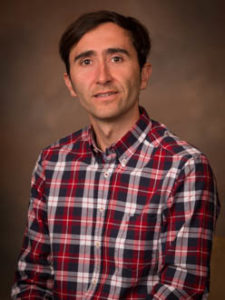 Department of mechanical engineering associate professor Marc Calaf and his partners from two other institutions have received funding from the National Science Foundation for a multi-faceted research project entitled “Centering Indigenous knowledge and values in the development of integrated, agroecological, renewable energy systems through convergent research.” This project brings perspectives from mechanical engineering, biology, and the social sciences in conversation with Indigenous communities to co-produce new knowledge focused on how renewable energy systems can interact synergistically with agricultural needs, other land-use, and environmental planning priorities.
Department of mechanical engineering associate professor Marc Calaf and his partners from two other institutions have received funding from the National Science Foundation for a multi-faceted research project entitled “Centering Indigenous knowledge and values in the development of integrated, agroecological, renewable energy systems through convergent research.” This project brings perspectives from mechanical engineering, biology, and the social sciences in conversation with Indigenous communities to co-produce new knowledge focused on how renewable energy systems can interact synergistically with agricultural needs, other land-use, and environmental planning priorities.
“We want Indigenous communities to find the solutions that meet their needs in the face of climate change by involving them in the process from start to finish,” said Calaf.
This approach will enable the participating communities to develop renewable energy systems that integrate Indigenous agriculture as well as environmental conservation and restoration priorities that scientists might otherwise miss. These systems work with a combination of photovoltaic solar systems and vertical axis wind turbines.
“One of my focuses will be in the development of numerical simulations that study the interactions of the renewable energy systems with the local land-atmosphere configuration,” said Calaf. “The flexibility of the simulations will help us test different configurations and arrangements to understand the influence of such systems in the local evapotranspiration of the soil and vegetation. Since the goal is to accommodate these systems to the interests of the communities, we will be looking at more than just maximizing energy production.”
This collaborative effort brings together researchers from three institutions. Professor Raúl Bayoán Cal from Portland State University has worked with Calaf before on renewable energy systems. Assistant Professor Diana Dehnam from the University of Oklahoma is focused on the social science side and Associate Professor Lara Souza will provide expertise in the biology domain. They will also be collaborating with the Zapotec university, Unixhidza, in Oaxaca, Mexico and the Pawnee Nation in Oklahoma. The five-year project includes training and workshops with Indigenous co-researchers as well as wind tunnel experiments, simulations, and experimental field sites.
“I am excited about the intrinsic collaboration with social sciences,” said Calaf. “But more than that, I look forward to collaborating with different communities. This may be the first time my research will have a direct and real impact on a community like this!”
You can find out more about Calaf’s research at the Laboratory of Wind, Energy, & Turbulence website.